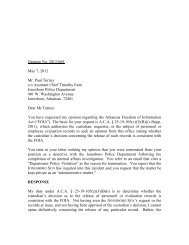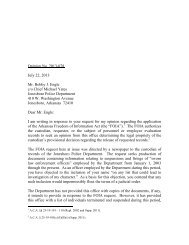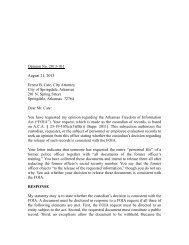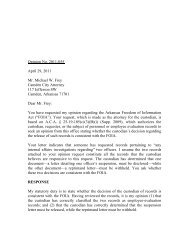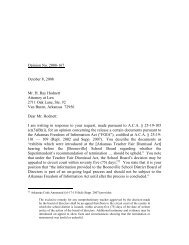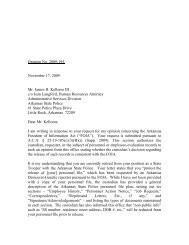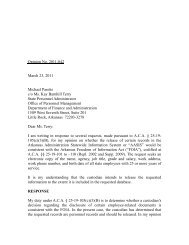Opinion No. 2009-105 June 25, 2009 Officer Shana Cobbs North ...
Opinion No. 2009-105 June 25, 2009 Officer Shana Cobbs North ...
Opinion No. 2009-105 June 25, 2009 Officer Shana Cobbs North ...
Create successful ePaper yourself
Turn your PDF publications into a flip-book with our unique Google optimized e-Paper software.
<strong>Opinion</strong> <strong>No</strong>. <strong>2009</strong>-<strong>105</strong><br />
<strong>June</strong> <strong>25</strong>, <strong>2009</strong><br />
<strong>Officer</strong> <strong>Shana</strong> <strong>Cobbs</strong><br />
<strong>No</strong>rth Little Rock Police Department<br />
200 West Pershing Boulevard<br />
<strong>No</strong>rth Little Rock, Arkansas 72114<br />
Dear <strong>Officer</strong> <strong>Cobbs</strong>:<br />
I am writing in response to your request for my opinion concerning the Arkansas<br />
Freedom of Information Act (“FOIA”). Your request is submitted pursuant to<br />
A.C.A. § <strong>25</strong>-19-<strong>105</strong>(c)(3)(B)(i) (Supp. 2007), which authorizes the custodian,<br />
requester, or the subject of personnel, employee evaluation, or job performance<br />
records to seek an opinion from this office stating whether the custodian’s decision<br />
regarding the release of such records is consistent with the FOIA.<br />
Your letter states that an inmate at the Pulaski County Detention Facility has<br />
submitted a FOIA request to the Personnel Department of the City of <strong>No</strong>rth Little<br />
Rock for your personnel file and Internal Affairs records. You object to the<br />
release of any information because you believe that the requester or other inmates,<br />
may use “any and all information he does receive … in a malicious way” to<br />
intimidate you, your family, or your friends.<br />
RESPONSE<br />
My duty under subsection <strong>25</strong>-19-<strong>105</strong>(c)(3)(B)(i) is to state whether the decision of<br />
the custodian of records is consistent with the FOIA. Your letter states that the<br />
requester has received a response from the Personnel Department concerning his<br />
request, but nothing in your letter indicates what records, if any, the Department<br />
has decided to release. Accordingly, I can only set out the legal standards the<br />
custodian must apply to determine whether certain documents contained in<br />
personnel and Internal Affairs files must be disclosed.
<strong>Officer</strong> <strong>Shana</strong> <strong>Cobbs</strong><br />
<strong>No</strong>rth Little Rock Police Department<br />
<strong>Opinion</strong> <strong>No</strong>. <strong>2009</strong>-<strong>105</strong><br />
Page 2<br />
A document must be disclosed in response to a FOIA request if all three of the<br />
following elements are met. First, the FOIA request must be directed to an entity<br />
subject to the act. Second, the requested document must constitute a public<br />
record. Third, no exceptions allow the document to be withheld.<br />
The first two elements appear met in this case. As for the first element, the<br />
documents are held by the Personnel Department of the City of <strong>No</strong>rth Little Rock,<br />
which is a public entity. As for the second element, the FOIA defines “public<br />
records” as:<br />
writings, recorded sounds, films, tapes, electronic or computer-based<br />
information, or data compilations in any medium, required by law to<br />
be kept or otherwise kept, and which constitute a record of the<br />
performance or lack of performance of official functions which are<br />
or should be carried out by a public official or employee, a<br />
governmental agency, or any other agency wholly or partially<br />
supported by public funds or expending public funds. All records<br />
maintained in public offices or by public employees within the scope<br />
of their employment shall be presumed to be public records.<br />
A.C.A. § <strong>25</strong>-19-103(5)(A) (Supp. 2007). Because the records are held by a public<br />
entity, they are rebuttably presumed to be public records. <strong>No</strong>t having seen any of<br />
the records in question, I cannot assess whether the presumption is actually<br />
rebutted in this instance. If the presumption is rebutted, then the document fails<br />
this element and the document must not be released. If the presumption cannot be<br />
rebutted, then the FOIA analysis proceeds to the third element: whether any<br />
exceptions preclude disclosure. There are two relevant exceptions and a general<br />
overriding constitutional concern of which the custodian must be aware.<br />
The FOIA provides two exemptions for items normally found in employees’ files. 1<br />
For purposes of the FOIA, items in employees’ files can usually be divided into<br />
1 This office and the leading commentators on the FOIA have observed that personnel files<br />
usually include: employment applications; school transcripts; payroll-related documents such as<br />
information about reclassifications, promotions, or demotions; transfer records; health and life<br />
insurance forms; performance evaluations; recommendation letters; complaint letters;<br />
disciplinary-action records; requests for leave-without-pay; certificates of advanced training or<br />
education; and legal documents such as subpoenas. E.g., Op. Att’y Gen. 97-368; John J. Watkins
<strong>Officer</strong> <strong>Shana</strong> <strong>Cobbs</strong><br />
<strong>No</strong>rth Little Rock Police Department<br />
<strong>Opinion</strong> <strong>No</strong>. <strong>2009</strong>-<strong>105</strong><br />
Page 3<br />
two mutually exclusive groups: “personnel records” under section <strong>25</strong>-19-<br />
<strong>105</strong>(b)(12); 2 or “employee evaluation or job performance records” under section<br />
<strong>25</strong>-19-<strong>105</strong>(c)(1). 3 The test for whether these two types of documents may be<br />
released differs significantly.<br />
If a document is a “personnel record,” the document is open to public inspection<br />
and copying except “to the extent that disclosure would constitute a clearly<br />
unwarranted invasion of personal privacy.” A.C.A. § <strong>25</strong>-19-<strong>105</strong>(b)(12) (Supp.<br />
2007). The FOIA does not define the term “personnel records.” Whether a<br />
particular record constitutes a “personnel record,” within the meaning of the FOIA<br />
is, of course, a question of fact that can only be definitively determined by<br />
reviewing the record itself. However, the Attorney General has consistently taken<br />
the position that “personnel records” are all records other than employee<br />
evaluation and job performance records that pertain to individual employees,<br />
former employees, or job applicants. See, e.g., Op. Att’y Gen. <strong>No</strong>. 1999-147,<br />
citing Watkins, THE ARKANSAS FREEDOM OF INFORMATION ACT, p.134 (m&m<br />
Press, 3d ed., 1998).<br />
The FOIA likewise does not define the phrase “clearly unwarranted invasion of<br />
personal privacy.” However, the Arkansas Supreme Court has construed the<br />
phrase. To determine whether the release of a personnel record would constitute a<br />
“clearly unwarranted invasion of personal privacy,” the court applies a balancing<br />
test. The test weighs the public’s interest in accessing the records against the<br />
individual’s interest in keeping the records private. See Young v. Rice, 308 Ark.<br />
593, 826 S.W.2d <strong>25</strong>2 (1992). The balancing takes place with a thumb on the scale<br />
& Richard J. Peltz, THE ARKANSAS FREEDOM OF INFORMATION ACT 181–82 (4th ed., m & m<br />
Press 2004).<br />
2 This subsection states: “It is the specific intent of this section that the following shall not be<br />
deemed to be made open to the public under the provisions of this chapter … (12) [p]ersonnel<br />
records to the extent that disclosure would constitute a clearly unwarranted invasion of personal<br />
privacy.”<br />
3<br />
This subsection states: “<strong>No</strong>twithstanding subdivision (b)(12) of this section, all employee<br />
evaluation or job performance records, including preliminary notes and other materials, shall be<br />
open to public inspection only upon final administrative resolution of any suspension or<br />
termination proceeding at which the records form a basis for the decision to suspend or terminate<br />
the employee and if there is a compelling public interest in their disclosure.”
<strong>Officer</strong> <strong>Shana</strong> <strong>Cobbs</strong><br />
<strong>No</strong>rth Little Rock Police Department<br />
<strong>Opinion</strong> <strong>No</strong>. <strong>2009</strong>-<strong>105</strong><br />
Page 4<br />
favoring disclosure. To aid in conducting the balancing test, the court in Young<br />
elucidated a two-step approach. First, the custodian must assess whether the<br />
information contained in the requested document is of a personal or intimate<br />
nature such that it gives rise to greater than de minimus privacy interest. Id. at 598,<br />
826 S.W.2d at <strong>25</strong>5. If the privacy interest is merely de minimus, then the thumb on<br />
the scale favoring disclosure outweighs the privacy interest. Second, if the<br />
information does give rise to a greater than de minimus privacy interest, then the<br />
custodian must determine whether that interest is outweighed by the public’s<br />
interest in disclosure. Id., 826 S.W.2d at <strong>25</strong>5. Because the exceptions must be<br />
narrowly construed, the person resisting disclosure bears the burden of showing<br />
that, under the circumstances, his privacy interests outweigh the public’s interests.<br />
Stilley, supra, at 313. The fact that the subject of any such records may consider<br />
release of the records an unwarranted invasion of personal privacy is irrelevant to<br />
the analysis because the test is objective. E.g., Op. Att’y Gen. <strong>No</strong>s. 2001-112,<br />
2001-022, 94-198.<br />
The question of whether the release of any particular personnel record would<br />
constitute a clearly unwarranted invasion of personal privacy is always a question<br />
of fact. Op. Att’y Gen. <strong>No</strong>s. 2006-176, 2004-260, 2003-336, 2003-201, 98-001. A<br />
number of documents contained in personnel files are typically releasable under<br />
this standard, with appropriate redactions. I believe a current employee’s job<br />
application, employment history, and any background investigation that served as<br />
a basis for his hiring constitute “personnel records” under the standard set forth<br />
above. As my predecessor noted in Op. Att’y Gen. 2007-278:<br />
Certain … employment-related records found in police personnel<br />
files are typically subject to release with any appropriate redactions.<br />
See, e.g., Op. Att’y Gen. <strong>No</strong>s. 2005-268 (mentioning job application<br />
documents, resumes, documents evidencing completion of<br />
psychological examination; and personal history statements as being<br />
subject to release with appropriate redactions); and 2004-178<br />
(discussing training files with scores redacted).<br />
In contrast, some information typically found in an employee’s personnel file are<br />
not subject to release under the FOIA. Some of those items include: dates of birth<br />
of public employees (Op. 2007-064); social security numbers (Ops. 2006-035,<br />
2003-153); medical information (Op. 2003-153); any information identifying
<strong>Officer</strong> <strong>Shana</strong> <strong>Cobbs</strong><br />
<strong>No</strong>rth Little Rock Police Department<br />
<strong>Opinion</strong> <strong>No</strong>. <strong>2009</strong>-<strong>105</strong><br />
Page 5<br />
certain law enforcement officers currently working undercover (A.C.A. § <strong>25</strong>-19-<br />
<strong>105</strong>(b)(10)); driver’s license numbers (Op. 2007-0<strong>25</strong>); insurance coverage (Op.<br />
2004-167); tax information or withholding (Ops. 2005-194, 2003-385); payroll<br />
deductions (Op. 98-126); banking information (Op. 2005-195); unlisted telephone<br />
numbers (Op. 2005-114); personal e-mail addresses (Op. 2004-2<strong>25</strong>); and marital<br />
status of employees and information about dependents (Op. 2001-080).<br />
<strong>No</strong>t having seen any records at issue, I cannot assess which records (if any) met<br />
the personnel-records definition. Consequently, I cannot assess whether the test<br />
for the release of personnel records is met.<br />
The second potentially relevant exception is for “employee evaluation or job<br />
performance records,” which the FOIA likewise does not define. But this office<br />
has consistently opined that the phrase refers to records that were created by (or at<br />
the behest of) the employer, and that detail the employee’s performance or lack of<br />
performance on the job. Op. Att’y Gen. 2004-012 (and opinions cited therein).<br />
This exception includes records generated while investigating allegations of<br />
employee misconduct that detail incidents that gave rise to an allegation of<br />
misconduct. Id.<br />
If a document meets the above definition, the document cannot be released unless<br />
the following elements have been met:<br />
1. There has been a final administrative resolution of any suspension<br />
or termination proceeding (finality);<br />
2. The records in question formed a basis for the decision made in<br />
that proceeding to suspend or terminate the employee<br />
(relevance); and<br />
3. There is a compelling public interest in the disclosure of the<br />
records in question (compelling interest).<br />
A.C.A. § <strong>25</strong>-19-<strong>105</strong>(c)(1) (Supp. 2007). All three of the conditions must be<br />
present before an evaluation or job performance record may be released. Op.<br />
Att’y Gen. 2008-065. <strong>No</strong>t having seen any of the documents in question, I cannot<br />
assess whether the records (if any) meet the definition of employee evaluation
<strong>Officer</strong> <strong>Shana</strong> <strong>Cobbs</strong><br />
<strong>No</strong>rth Little Rock Police Department<br />
<strong>Opinion</strong> <strong>No</strong>. <strong>2009</strong>-<strong>105</strong><br />
Page 6<br />
records. Consequently, I cannot assess whether the documents formed the basis<br />
(i.e., the relevance prong) of a final administrative proceeding for suspension or<br />
termination (i.e., the finality prong).<br />
As for the third prong, the FOIA never defines the key phrase “compelling public<br />
interest.” But two leading commentators on the FOIA, referring to this office’s<br />
opinions on this issue, have offered the following guidelines:<br />
[I]t seems that the following factors should be considered in<br />
determining whether a compelling public interest is present: (1) the<br />
nature of the infraction that led to suspension or termination, with<br />
particular concern as to whether violations of the public trust or<br />
gross incompetence are involved; (2) the existence of a public<br />
controversy related to the agency and its employees; and (3) the<br />
employee’s position within the agency. In short, a general interest in<br />
the performance of public employees should not be considered<br />
compelling, for that concern is, at least theoretically, always present.<br />
However, a link between a given public controversy, an agency<br />
associated with the controversy in a specific way, and an employee<br />
within the agency who commits a serious breach of public trust<br />
should be sufficient to satisfy the “compelling public interest”<br />
requirement.<br />
Watkins & Peltz, supra, at 207 (footnotes omitted). Professors Watkins and Peltz<br />
also note that “the status of the employee” or “his rank within the bureaucratic<br />
hierarchy” may be relevant in determining whether a “compelling public interest”<br />
exists. Id. at 206 (noting that “[a]s a practical matter, such an interest is more<br />
likely to be present when a high-level employee is involved than when the<br />
[records] of ‘rank-and-file’ workers are at issue.”) With respect to allegations of<br />
police misconduct, I noted as follows in Op. Att’y Gen. 2007-206:<br />
a compelling public interest likely exists in information reflecting a<br />
violation of departmental rules by a “cop on the beat” in his<br />
interactions with the public. See Op. Att’y Gen. 2006-106. If the<br />
prior disciplinary records reflect a suspension based on this type of<br />
infraction, a strong case for the finding of a compelling public<br />
interest exists.
<strong>Officer</strong> <strong>Shana</strong> <strong>Cobbs</strong><br />
<strong>No</strong>rth Little Rock Police Department<br />
<strong>Opinion</strong> <strong>No</strong>. <strong>2009</strong>-<strong>105</strong><br />
Page 7<br />
Whether there is a compelling public interest in particular records is a question of<br />
fact that must be determined in the first instance by the custodian of the records,<br />
considering all of the relevant information. <strong>No</strong>t having seen any of the records in<br />
question, I cannot assess this third prong.<br />
In my opinion, any records relating to disciplinary actions or internal affairs<br />
investigations clearly fall within the category of employee evaluation/job<br />
performance records, subject to review under the standard discussed above. Given<br />
that I am not a finder of fact and have not been provided any of the records at<br />
issue, I am unable to opine regarding which documents, if any, are subject to<br />
disclosure. However, as a matter of law, disciplinary actions, if any, which did not<br />
result in suspension or termination, must be deemed exempt from release.<br />
Apart from the legal tests for personnel records and employee evaluation records,<br />
the custodian should be aware of some general constitutional implications of<br />
disclosure. Any party who may be identified from any of the requested records<br />
may have a constitutionally-protected privacy interest in those records. The<br />
Arkansas Supreme Court has recognized that the constitutional right of privacy<br />
can supersede the specific disclosure requirements of the FOIA, at least with<br />
regard to the release of documents containing constitutionally-protectable<br />
information. McCambridge v. City of Little Rock, 298 Ark. 219, 766 S.W.2d 909<br />
(1989). The McCambridge court held that a constitutional privacy-interest applies<br />
to matters that: (1) an individual wants to and has kept confidential; (2) can be<br />
kept confidential but for the challenged governmental action in disclosing the<br />
information; and (3) would be harmful or embarrassing to a reasonable person if<br />
disclosed.<br />
Whether certain information is constitutionally protected under the right to<br />
privacy, is a highly factual decision the custodian of records must initially make.<br />
If the custodian determines that the records contain constitutionally-protectable<br />
information (i.e., information that meets the McCambridge test), then the<br />
custodian must consider whether the governmental interest in disclosure (i.e., the<br />
public’s legitimate interest in the matter) outweighs the privacy interest in<br />
withholding them. As always, the person claiming the right will have the burden<br />
of establishing it.
<strong>Officer</strong> <strong>Shana</strong> <strong>Cobbs</strong><br />
<strong>No</strong>rth Little Rock Police Department<br />
<strong>Opinion</strong> <strong>No</strong>. <strong>2009</strong>-<strong>105</strong><br />
Page 8<br />
Assistant Attorney General Ryan Owsley prepared the foregoing opinion, which I<br />
hereby approve.<br />
Sincerely,<br />
DUSTIN MCDANIEL<br />
Attorney General<br />
DM/RO:cyh



